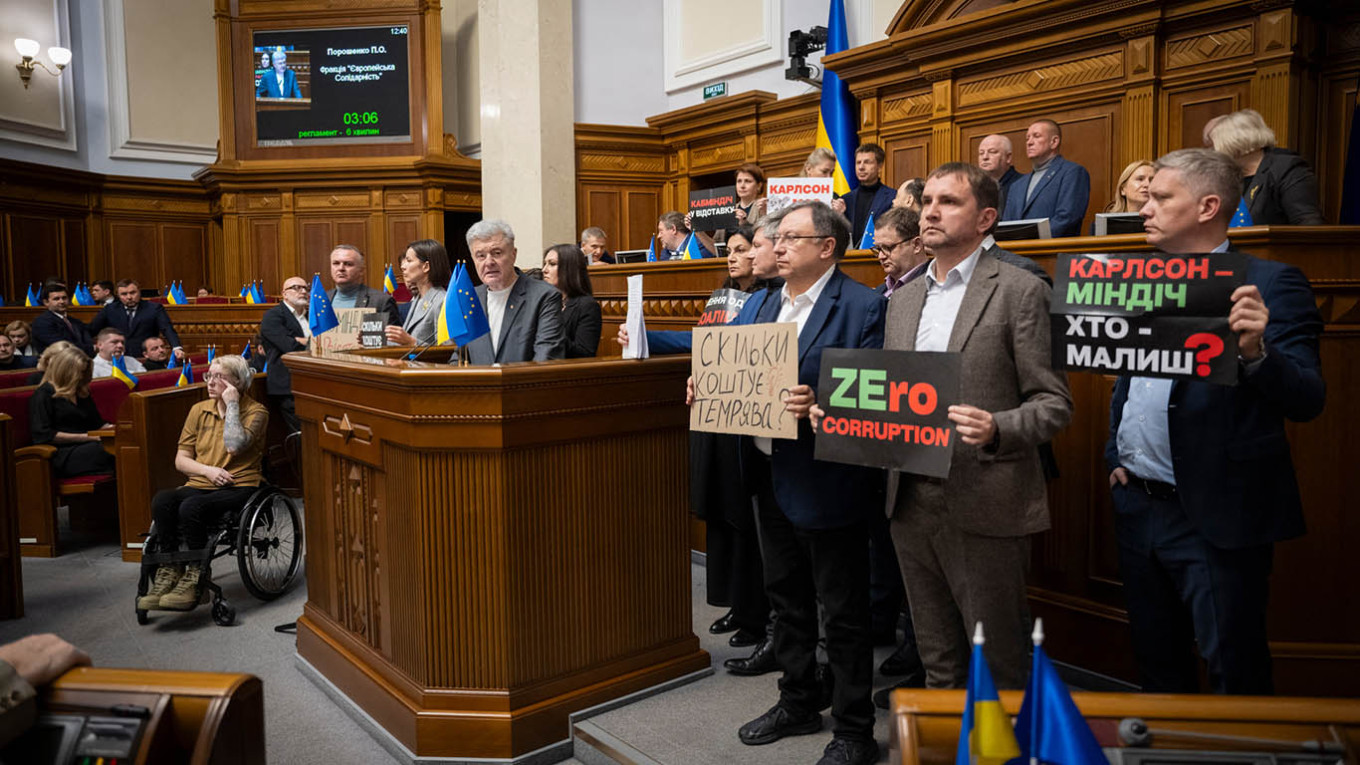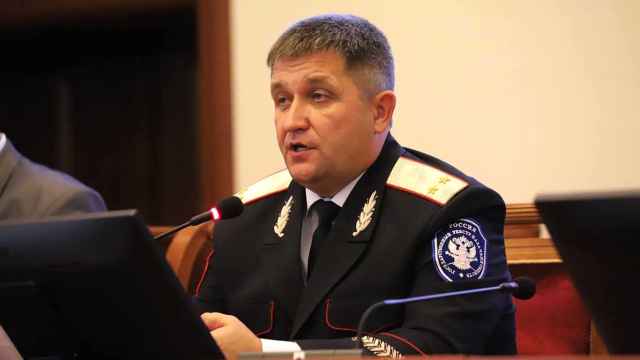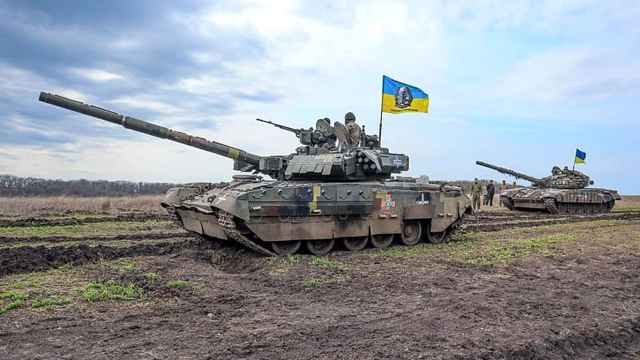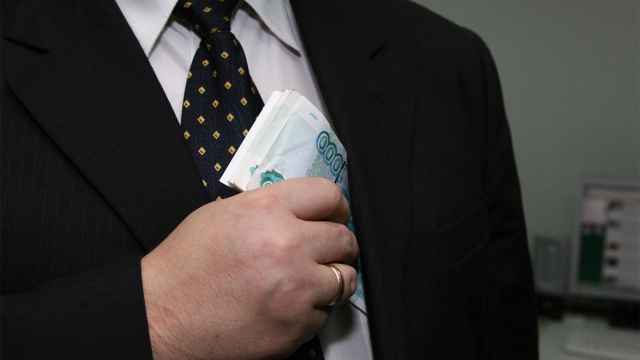Russian officials and pro-Kremlin media are relishing in the biggest corruption scandal to engulf Ukraine since Moscow’s full-scale invasion, slamming Western aid to the embattled country and suggesting that Washington is trying to use it to pressure Kyiv into agreeing to a peace deal.
Ukraine’s anti-corruption watchdog revealed the $100-million scheme in the energy sector amid rolling blackouts across the country, naming a businessman linked to President Volodymyr Zelensky as the alleged mastermind.
“The current scandal involving Ukraine’s illegitimate authorities and Zelensky’s cronies is the largest scandal in the entire period of rule by the illegitimate President Zelensky, whose power depends on Western arms supplies and the forced mobilization of Ukrainian men to the front against Russia,” said the Moskovsky Komsomolets newspaper.
During Thursday’s daytime broadcast, Olga Skabeeva, host of the “60 Minutes” talk show on the Rossia 1 TV channel, discussed rumors that Zelensky may have been deliberately pressured into peace talks, saying that the timing of the corruption scandal and reports about U.S. President Donald Trump’s new peace proposal may not be coincidental.
“Zelensky’s tame propagandists, meanwhile, are accusing the opposition of deliberately inflating the corruption scandal in order to force Zelensky into peace — on Putin’s terms,” Skabeeva said, referring to Ukrainian politicians and journalists.
The possible dismissal of Zelensky’s influential chief of staff Andrii Yermak “would be a double defeat for Zelensky,” one of Skabeeva’s guests said.
“The moment he shows any weakness at home, that’s it — he will be completely and irreversibly devoured by his critics… If he doesn’t do this, it means he is making a public statement that he is ready to share responsibility, together with his chief of staff,” he said, adding that Zelensky has not been formally charged with a crime.
The Nezavisimaya Gazeta newspaper cited experts as saying that the scandal has become “a way for Washington to put pressure on Ukraine, aimed at forcing [Kyiv] to agree to the peace arrangements planned by the Russian and U.S. presidents in Alaska.”
For Russian officials, the scandal has offered new fuel to their claims that Western taxpayers are being fleeced by corrupt politicians in Kyiv.
“The money that European countries sent to Ukraine, taking it from their own people, was embezzled by the Kyiv regime. This has now become obvious to everyone,” State Duma Speaker Vyacheslav Volodin said.
Yekaterina Andreyevna, a popular news anchor on the state-run Channel One, described the Ukrainian anti-corruption investigation as “a TV series that is piling up kompromat and sowing chaos in Ukraine’s political sphere.”
Another Channel One correspondent, who continued the news segment by discussing Zelensky’s trip to Turkey for peace talks, said: “While the adults who are in one way or another connected to the high-profile corruption scandal are not at home, Kyiv is basically having a holiday of disobedience.”
The correspondent also alleged that the Ukrainian leader had primarily gone abroad to escape his problems rather than to hold talks on the war with Turkish leader Recep Tayyip Erdoğan.
“The cherry on top of the absurdity” was his peace talks with Erdoğan being the announced purpose of the trip, the correspondent said.
“This sounds rather strange, given that only last week the Ukrainian Foreign Ministry officially announced that Kyiv had ruled out negotiations with Moscow this year,” he said.
“Now it’s clear why Zelensky suddenly needed to get away — to breathe the fresh air of Greece, France, Spain and now Turkey, so to speak. In short, to get as far as possible from these stuffy corruption-mongers in Kyiv,” the correspondent continued.
Channel One’s correspondent also suggested that the European press had been ordered to refrain from extensively covering the corruption scandal.
“The American press hasn’t been very sympathetic toward the Ukrainian authorities lately, but Europe is following a different trend. Of course, they have to write something about the scandal, but whenever there’s an opportunity not to, they don’t,” the correspondent said on air.
“For example, there isn’t a word about it on the BBC or Sky News websites,” the correspondent said, despite the BBC and Sky News both having covered the story.
“The online edition of Germany’s Welt skips news from Kyiv altogether, France’s Le Figaro has only a tiny brief and Spain’s El País is instead writing in detail about Ukrainian astronomers who continue observing the stars even in this difficult time for the country,” the correspondent continued. “It all looks like following a playbook.”
A Message from The Moscow Times:
Dear readers,
We are facing unprecedented challenges. Russia's Prosecutor General's Office has designated The Moscow Times as an "undesirable" organization, criminalizing our work and putting our staff at risk of prosecution. This follows our earlier unjust labeling as a "foreign agent."
These actions are direct attempts to silence independent journalism in Russia. The authorities claim our work "discredits the decisions of the Russian leadership." We see things differently: we strive to provide accurate, unbiased reporting on Russia.
We, the journalists of The Moscow Times, refuse to be silenced. But to continue our work, we need your help.
Your support, no matter how small, makes a world of difference. If you can, please support us monthly starting from just $2. It's quick to set up, and every contribution makes a significant impact.
By supporting The Moscow Times, you're defending open, independent journalism in the face of repression. Thank you for standing with us.
Remind me later.







